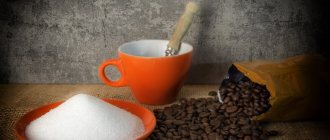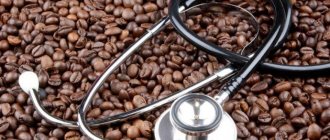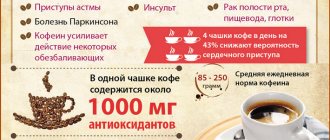Use for heart disease
Scientists continue to argue to this day about how coffee affects the heart in the presence of various diseases. If previously it was believed that heart patients should completely avoid this drink, now there is no strict prohibition. Avoid espresso only in rare cases.
For hypertension
Not so long ago, doctors categorically forbade drinking coffee drinks for hypertension. It was recommended to replace them with decaffeinated ones. However, recent studies have shown that even decaffeinated coffee increases blood pressure.
Accordingly, a natural stimulant has nothing to do with it. On the contrary, one serving of espresso per day will not cause harm, but will prevent sudden jumps in blood pressure.
Is it possible to drink coffee if you have heart arrhythmia?
Even with atrial fibrillation, drinking coffee is not strictly prohibited. According to statistics, people who do not drink coffee drinks are hospitalized more often with this disease than avid coffee drinkers. In addition, if the heartbeat is very rare, using natural espresso will help normalize the heart rhythm.
For heart failure
Clinical studies have shown that caffeine is not harmful to the heart in this disease. Therefore, you shouldn’t give up a serving of your favorite espresso.
Is it possible to drink coffee with tachycardia?
The coffee drink itself is not capable of triggering tachycardia. However, against the background of its use, the following changes are possible:
- increased heart rate;
- feeling of lack of air;
- darkness in the eyes;
- wobbly legs;
- intense sweating.
Naturally, if such symptoms appear, caffeine-containing drinks should be avoided.
After bypass
After coronary artery bypass surgery, a person needs to adhere to a gentle diet for a long time. True, only alcohol is strictly prohibited. Most doctors are loyal to coffee. If a person really wants to drink his favorite drink, then he shouldn’t deny himself this. The main thing is that it is not strong. It is advisable to add milk to it.
Is it possible to drink coffee if you have angina?
Caffeine does not provoke angina, but if this pathology already exists, the natural stimulant will reduce the gaps in the arteries pumping blood. As a result, the heart muscle will experience oxygen deficiency and increase the risk of coronary spasm.
Therefore, you should not drink coffee if you have angina. It should be replaced with chicory or other non-caffeine drinks.
After a heart attack
After a heart attack, the body does not need the strong invigorating effect of caffeine. Long rest is recommended. True, if a person is accustomed to small portions of espresso, drinking one cup a day is not prohibited. The main thing is to mix it in equal proportions with milk. In this case, positive emotions will be received, which are extremely important for a speedy recovery.
For ischemic disease
At the end of the last century, it was believed that coffee for cardiac ischemia is strictly contraindicated. True, recent studies have proven that this disease occurs with equal frequency in avid coffee drinkers and people who do not drink coffee drinks at all.
If your blood pressure is significantly reduced due to coronary artery disease, a serving of espresso will only bring benefits. It is not dangerous and there will be no harm from its use.
Can this drink stop your heart?
Purely theoretically, coffee can stop the heart. True, you need to drink a huge amount of it. A fatal outcome is possible if a person drinks espresso all day and night, taking very short breaks. Death occurs after at least 70 cups of this drink. Naturally, it is almost impossible to drink such an amount of liquid containing caffeine.
Coffee can have a positive effect on the body even in the presence of a number of heart pathologies. The main thing is to consume it in moderation. Abuse will negatively affect the condition and can lead to aggravation of the situation.
Is it possible to drink coffee if you have heart problems?
Caffeine increases cardiac activity, stimulates the vasomotor center, increases heart rate and briefly increases blood pressure. These changes are not dangerous for the body of a healthy person. Why can a healthy drink become dangerous?
People with heart problems should either give up the drink or drink no more than 2 cups per day
Due to the listed properties, people with heart rhythm disturbances (tachycardia, atrial fibrillation) should consume the drink with caution.
For arrhythmia
Arrhythmia occurs due to disruption of the heart muscle; drinking caffeine-containing drinks does not have any effect on the disease.
For arrhythmia, it is better to add milk to coffee to reduce its effect on the body
Rules for use for arrhythmia:
- Dilute the drink with milk or cream.
- Do not drink on an empty stomach. This can cause headaches and weakness during the day.
- Refuse the drink at times when the body is weakened: during stress, illness and lack of sleep.
For angina pectoris
Angina is a narrowing of blood vessels that slows blood flow to the heart. If you have an attack, drink a glass of water and relax. It is not recommended to use coffee as a medicine; it only removes fluid from the body.
If you have angina, you need to monitor your condition and not increase the maximum permissible dose of coffee (700 ml per day)
There is no need to completely give up the drink. Rules for use by a person who suffers from angina pectoris:
- Take the drink with plenty of water.
- Don't drink in stressful situations.
- No more than 2-3 cups during the day.
Opinions of domestic and European scientists
On the issue of the principle of the influence of caffeine on blood pressure and vascular behavior, the views of Russian and American specialists differ. This substance itself can be present in both coffee and strong tea, so arrhythmia is caused by both equally.
Doctors in Russia often recommend avoiding invigorating drinks, while in the United States they say they have no harmful effects. That is, coffee for tachycardia is completely acceptable, moreover, coffee significantly reduces the risk of hospitalization for complications. As a result of research, Danish scientists received the following information:
- Heart arrhythmia and coffee have a rather vague connection;
- rapid pulse is not a guarantee of tachycardia;
- the amount of drink consumed does not affect the development of atrial fibrillation (atrial fibrillation);
- dysfunction of the sinus node depends on many factors, among which the increased concentration of caffeine occupies the smallest percentage.
Nutrition for tachycardia
Tachycardia is an acceleration of the heart rate, which occurs as a reaction to increased body temperature, emotional and physical stress, smoking, alcohol consumption, decreased blood pressure (as a result of bleeding) and hemoglobin levels (for example, with anemia), with increased thyroid function glands, malignant tumors, purulent infection, use of certain medications. Also, tachycardia can be caused by pathology of the heart muscle, disturbances in the electrical conductivity of the heart.
Reasons for the development of tachycardia
- excessive consumption of caffeine-containing products;
- diseases of the cardiovascular system (heart disease, ischemia, heart attack, hypertension);
- disease of the thyroid gland and endocrine system;
- infectious diseases;
- pregnancy.
Signs of tachycardia:
darkening in the eyes, pain in the chest, rapid heart rate at rest and without objective reasons, frequent dizziness, repeated loss of consciousness.
Consequences of tachycardia
wear and tear of the heart muscle, heart failure, impaired electrical conductivity of the heart and the rhythm of its work, arrhythmic shock, acute cerebral circulatory failure, thromboembolism of cerebral vessels and pulmonary arteries, ventricular fibrillation.
The diet for tachycardia should be based on the following principles:
- 1 regular meal;
- 2 small servings;
- 3 abstaining from food at night;
- 4 limiting sweets;
- 5 spend fasting days;
- 6 the daily dose of fat should be no more than 50 g;
- 7 high content of foods rich in magnesium and potassium;
- 8 low calorie content.
It is also recommended to use a dairy-vegetable diet.
Useful products include:
- honey (improves blood supply to the heart and dilates blood vessels);
- foods with high levels of iron, magnesium and potassium (raisins, dried apricots and apricots, cherries, chokeberries, almonds, celery, grapefruits, grapes, dates, figs, prunes, parsley, cabbage, black currants, celery root, pineapples, bananas, dogwoods and peaches);
- rye and wheat bran;
- nuts;
- rosehip decoction or herbal tea (strengthens the heart muscle);
- fresh raw vegetables, baked or chopped (for example: Jerusalem artichoke, eggplant, beets) and vegetable salads, as they contain many microelements and vitamins with a small amount of calories;
- fresh fruits, berries (for example: viburnum, rowan, lingonberry), juices, compotes, mousses, jelly, jelly from them;
- dried fruits;
- protein steam omelet, soft-boiled eggs (no more than one egg per day);
- fermented milk products (yogurt, kefir, low-fat cottage cheese), whole milk, sour cream (as a dressing for dishes);
- porridge with milk or water, cereals and puddings;
- bran bread, day-old bread;
- cold beetroot soup, vegetarian soups from vegetables and cereals, fruit and milk soups;
- lean varieties of pork, beef, turkey and chicken, veal (steamed, oven-cooked or minced meat);
- low-fat varieties of boiled or baked fish, in the form of cutlets, meatballs, meatballs;
- mild sauces based on vegetable broth (for example: milk, sour cream, fruit sauces);
- sunflower, corn, flaxseed and other types of vegetable oil (up to 15 grams per day).
Folk remedies for tachycardia
- herbal teas from mint, lemon balm, hawthorn, motherwort and valerian;
- sachet pillows (for example: with valerian root);
- a soothing collection of valerian root and dry mint (place two spoons of the collection in a thermos, fill half with boiling water, leave for two hours, store in the refrigerator for no more than a month) take a glass of infusion during an attack in small sips;
- infusion of horsetail and hawthorn (pour two tablespoons of a mixture of herbs with boiling water in an enamel container, leave for three hours with the lid tightly closed, strain) take half a glass twice a day for three weeks);
- an infusion of hop cones and mint (use one teaspoon of the mixture per glass of boiling water, leave for ten minutes) drink in small sips at a time;
- elderberries and honeysuckle (raw, berry jam);
- decoction of elderberry bark (2 tablespoons of crushed bark per liter of boiling water, boil for ten minutes) take a decoction of 100 grams in the morning and evening.
Prevention
As with any disease, an important place should be given to prevention, because any disease is easier to prevent than to treat. Tachycardia is not gender specific and can occur in both men and women, so preventive measures will be useful for everyone
First of all, it is necessary to normalize the daily routine, go to bed on time and devote a sufficient amount of time to sleep. Giving up bad habits is also an important component in preventing an increase in heart rate. Stick to proper nutrition: reduce the amount of coffee and chocolate you drink, be sure to include fruits and vegetables in your diet. If possible, avoid stress and prolonged nervous tension. Despite the fact that physical activity itself can increase the number of heart contractions, it should still be given to the body, but at the same time monitor your condition and control your pulse. It is imperative to promptly and correctly treat infectious diseases, undergo medical examination and monitor your health.
Regardless of the cause, it is important to be aware of the symptoms of tachycardia, what it is, how to treat it, and what dangers it can pose. https://www.youtube.com/embed/0RuMF3iIvLM
Who's at risk
Tachycardia is diagnosed in children, young people, and the elderly, although until recently there was a stereotype that the problem appears only in older people. What has really changed?
Has the number of patients increased or information about tachycardia in young people could not previously have been known to doctors; has the development of the healthcare system made it possible to keep more strict records? Hard to tell. Perhaps it’s both.
There is a third reason for the increase in the number of cases and changes in age ranges - environmental deterioration, changes in living conditions. The development of civilization is characterized by an increasing load on the nervous system every day and a disruption of natural biological rhythms. Almost every person is at risk.
Is it possible to prevent the occurrence of pathology?
The main thing is to lead a healthy lifestyle and not deplete the body’s resources unless absolutely necessary. The reserves of strength may be great, but they are not limitless. Taking good care of yourself can reduce the level of cardiovascular diseases and pathologies of the nervous system.
If you take care of your health from a young age, your life will be long, harmonious, and happy.
Is it possible to drink coffee if you have arrhythmia?
Arrhythmia, that is, irregular heart rhythm, occurs in many people. At the same time, there is a feeling that the heart is beating, then not beating, then slower, then more often.
Most of those who care about their health have a question: is it possible to drink coffee with arrhythmia, will it harm? Can your favorite drink cause arrhythmia? And what to do if you don’t want to give up your favorite drink? It turns out that everything is not so scary, and in some cases coffee is even beneficial.
Can coffee cause arrhythmia?
No, the disease “arrhythmia” does not occur just because you drink coffee. Unless you drink more than 5-6 cups a day, and of strong drink. And then, in this case, the problem is in the heart itself, and coffee can only provoke tachycardia, but this also happens to completely healthy people. And the problem here is only an overdose of caffeine.
If you drink coffee in moderation, it will not cause arrhythmia. The reaction, of course, is individual, but in general the data is exactly the same. You will not get arrhythmia if you drink 2-3 cups of coffee a day.
Research by scientists
Unlike many other small studies conducted by private institutions, scientists have become quite seriously interested in the connection between coffee and arrhythmia.
In a joint project between the United States and Denmark, scientists observed a huge group of volunteers, about 130,000 people, for several years.
These were men and women aged from 18 to 90 years (mostly under 50 years old), some of whom did not drink caffeine at all, others drank 1-3 cups a day, and almost a fifth drank at least 4 cups of their favorite drink per day.
Scientists were unable to find any specific link between coffee consumption and hospital admission for arrhythmia. This proves that you don't need to give up coffee just to avoid arrhythmia.
If you don't usually drink coffee, you shouldn't start to prevent arrhythmia. But if you drink, you shouldn’t give it up or reduce your usual dose. This can affect anything, but not arrhythmia.
How much coffee can you drink if you have arrhythmia?
Scientists have proven that drinking up to 5 cups of caffeine-containing drinks per day is perfectly acceptable if this is your usual dose. You don't have to lower it.
However, if you drink 2 cups a day, you should not switch to 4 in order to increase the dose of caffeine and fall into a lower risk group. The body is already accustomed to this dosage and concentration of the stimulant, and it works normally.
On average, 2-3 cups per day is safe for most people with heart disease. A one-time excess of one cup will not provoke catastrophic consequences and will not cause arrhythmia unless there is an overdose of caffeine. But you need to follow some rules.
Rules for drinking coffee for arrhythmia
By following some simple recommendations, you are guaranteed not to harm yourself. But in any case, listen to your feelings and focus not on general advice, but solely on your body.
- Do not drink coffee on an empty stomach, especially if you are not going to have breakfast in a few minutes. After sleep, the body is slightly weakened, and tachycardia may occur.
- Try adding milk, cream or lemon to your drink to slightly reduce the caffeine concentration.
- Get into the habit of drinking your favorite drink with water to dilute the blood so it's not as thick - this will help reduce the likelihood of blood clots.
- Try to give up caffeine at times when your body is weakened: when you are sick, stressed, lack of sleep or jet lag.
If you drank coffee and feel arrhythmia, drink water or milk, lie down, try to breathe deeply. This usually goes away within 20 minutes.
Conclusions:
- Drinking coffee does not lead to arrhythmia.
- Scientists have proven that those who drank 2-4 cups of coffee per day were 7-10% less likely to be hospitalized with arrhythmia than those who did not drink it at all.
- It is safe to drink 2-3 cups of coffee per day, preferably with milk or water, not too sweet.
- If your blood pressure drops due to arrhythmia, you need to drink a strong, sweet drink.
- Always focus on your personal feelings, and consult with your doctor about how much coffee you can drink if you have arrhythmia.
If you liked the site, share the link with your friends. Thank you!
Coffee: lowers or increases blood pressure, how does it affect a person’s pulse?
People consume 580-590 billion cups of coffee per year. This is the global level of consumption of this drink. Some do not see anything dangerous in this; on the contrary, they consider the drink a source of energy and nutrients.
Others have heard about the risks of overuse, but continue to revel in the natural energy drink. The biggest debate is about the effect of coffee on blood pressure.
So does coffee lower it or raise it? It's time to dot all the i's.
The effect of coffee on blood pressure
Speaking about the effect, you need to take into account the initial blood pressure indicators: normal, increased or decreased. For a healthy person, this drink does not pose a threat; on the contrary, coffee has a positive effect:
- helps to wake up;
- improves concentration;
- relieves headaches;
- provides a slight laxative effect;
- speeds up metabolism;
- activates brain function;
- lifts the mood;
- has a mild diuretic effect and relieves swelling;
- provides prevention of cancer, cirrhosis, diabetes;
- reduces cravings for sweets;
- serves as an antioxidant.
The iron and potassium contained in the product, when consumed in moderation, help maintain the health of the cardiovascular and circulatory systems. However, it is important to remember that we are talking about a natural product in grains, and not about its analogues. Only grains contain all the necessary nutrients, microelements, vitamins, and nutrients. The soluble product contains fats and waste from processing.
If there is too much caffeine in the body, the product raises a person’s blood pressure and provokes increased production of adrenaline, cortisol and other stress hormones. Frequent and abundant consumption of the drink can also provoke the development of hypertension, arrhythmia, tachycardia, blood diseases and cause increased heart rate.
Interesting! Why do you serve cold water with coffee?
Many coffee lovers are interested in how many notches their favorite drink increases blood pressure. It is enough to drink 2-3 cups of drink per day so that the upper pressure after coffee rises by 8-10 values, and the lower one by 5-7.
For someone who already suffers from hypertension, these are significant changes. This is especially acute in the first 60 minutes, but the effect can last for three hours or even longer.
Therefore, doctors recommend that all lovers of this drink reduce their usual portions.
While everything is more or less clear about the influence of the classic product, there is still controversy surrounding green coffee. Some say it is a safe and healthy product.
And someone claims that this is an identical product. The truth is in the middle: these are unroasted coffee beans, meaning their composition and effect are similar to the roasted product.
It turns out that all of the above is true for an “outlandish” type of product.
How does the drink affect people suffering from hypertension or hypotension? Let's take a closer look.
With increased
For hypertension, coffee can help lower blood pressure. However, for this you need to drink it according to a special scheme: drink 2-3 cups of the drink daily.
In addition, the researchers note that natural predisposition plays a role: in some people coffee increases blood pressure, while in others it causes blood pressure to drop.
It all depends on the individual characteristics of the body, which are difficult to determine in advance, as well as difficult to notice with the naked eye. You need to listen to yourself and observe your reaction to coffee.
Another feature that experts note is that if high blood pressure is caused by caffeine addiction, then there is no need to worry. If a person drinks 2-3 cups of this drink daily for three years, then such a lifestyle cannot cause an even greater deterioration in blood pressure.
Interesting! How much caffeine is in a cup of coffee
At reduced
Some people recommend drinking coffee for hypotension because caffeine supposedly raises blood pressure. Yes, many people with addiction experience a slight increase in blood pressure, which helps them feel great and more alert. However, doctors do not approve of this method. Experts are confident that with low blood pressure, the drink can both increase it and lower it even further.
Therefore, doctors do not recommend drinking coffee to increase blood pressure. It is better to use sweet tea or take medications prescribed by your doctor. If we are not talking about addiction, then a cup of strong drink, consumed from time to time, can help people with hypotension. However, frequent use with the best intentions will cause the body to develop a habit.
Then the entire increasing effect will be nullified.
When does caffeine lower blood pressure?
Caffeine, when consumed in moderation, always keeps blood pressure normal. It stimulates the nervous system, dilates blood vessels, which leads to a feeling of cheerfulness. Therefore, it is recommended to drink the drink only when drowsiness or fatigue. It is not recommended to drink it at night.
There is a widespread belief among people that drinking coffee with added alcohol lowers blood pressure. It is a myth. Doctors do not recommend mixing these drinks.
This combination not only increases blood pressure, but can also cause arrhythmia and liver disease. However, some doctors allow a combination of coffee and cognac (up to 70 g of the latter per day).
Strong alcohol lowers blood pressure and normalizes heartbeat and blood flow, which neutralizes the effect of coffee.
Another similar principle works if you mix coffee with milk or other dairy, but not too fatty additives. The fact is that proteins and fats prevent the absorption of caffeine into the walls of blood vessels.
However, this does not mean that any combination of drinks completely eliminates risks and dangers. This combination is safe for healthy people, but such mixtures are contraindicated for hypertensive patients.
In this case, you cannot count on a decrease in pressure.
The only case where a drink definitely lowers blood pressure is decaffeinated coffee. This product does not contain the main substance that excites the nervous system. Only those elements that have a diuretic effect remain, which leads to a decrease in blood pressure. This type of product should not be taken by people with hypotension.
Under what conditions is it contraindicated?
You should not drink coffee if you have any chronic problems with blood pressure: it either lowers or increases blood pressure. However, the list of restrictions is slightly different. For example, if you have hypertension (resting levels above 140/90), you should not drink espresso. The maximum permissible threshold at which you are allowed to drink the drink is 130/85.
Interesting! How many cups of coffee can you drink per day?
How dangerous is it to drink coffee if you have hypertension? Even the first stage of the disease is a contraindication, and even at stages 2 or 3, consuming a strong drink can even provoke a stroke.
Avoid coffee if you have been diagnosed by a doctor or regularly experience the following symptoms:
- swelling, especially in the morning;
- nausea and/or vomiting,
- memory problems;
- swelling and redness of the face;
- headache;
- dizziness;
- general weakness.
It is not recommended to drink coffee in the following situations:
- stress (the body is already working at the limit, hormonal levels are disrupted, blood vessels are spasmodic);
- obesity (all patients suffer from high blood pressure);
- there is a risk of genetic inheritance of diseases (relatives have been diagnosed with hypertension or have coffee intolerance);
- there is a deficiency of magnesium;
- There are diseases of the thyroid gland, kidneys, and musculoskeletal system.
Instant coffee (the one that most people drink) is even more harmful, especially if you have hypertension. This is a product of grain processing, waste. This drink causes sudden and strong surges in blood pressure.
Source: https://StoriesCoffee.ru/davlenie-ponizhaet-ili-povyshaet
What kind of coffee can you drink if you have tachycardia?
You should definitely give up instant coffee. It is made from cheaper robusta, which has much more caffeine than Arabica. In addition, instant coffee contains emulsifiers, flavor enhancers, stabilizers, dyes and other additives that are harmful to a weakened body. There are many cases when people with tachycardia after instant coffee, switching to natural coffee, completely forgot about the manifestations of the disease.
- Natural coffee is healthy, but in minimal concentrations, and preferably from Arabica beans. It is best to add milk or cream to it and not add sugar.
- Decaffeinated coffee is a good choice. Many manufacturers make decaffeinated coffee very similar in taste and smell to natural coffee, but again, choose ground rather than instant, and from a reputable manufacturer.
- Green coffee is not a panacea. It contains the same amount of caffeine as roasted coffee, so it has the same effect on the body. You can drink green coffee without caffeine or additives, and preferably with milk.
- Chicory is not coffee at all, but some coffee lovers who are not too demanding of taste choose it. There is no caffeine in it, so you can drink the drink in any quantity, or supplement it with your morning cup of natural coffee throughout the day.
Do not drink coffee if you have tachycardia on an empty stomach. Preferably at least an hour after eating.
Don't add sugar to your coffee. Sometimes giving it up relieves the symptoms of tachycardia after a cup of coffee.
The benefits and harms of different coffee drinks
The effect of coffee on the heart largely depends on what kind of drink is consumed. It is recommended to give preference to natural black. The best additions to it are spices and milk.
Drinking drinks made from green, unroasted grains is less harmful to the body. Sometimes doctors recommend choosing a decaffeinated product.
Instant coffee will be especially harmful. It contains a lot of dyes, aromatic and flavoring additives. Therefore, it has a negative effect on the body in general and the cardiovascular system in particular.
When brewing espresso, you should avoid prolonged contact of coffee powder with water. Otherwise, the caffeine concentration will be higher. It is best to prepare it in a coffee machine.
Safe dose
The caffeine limit set by the European Food Safety Authority is no more than 400 mg per day. A cup of espresso contains up to 75 mg of caffeine; for latte and cappuccino this figure is halved due to the presence of milk.
You should not drink coffee on an empty stomach. Once on the unprotected mucous membrane, caffeine is instantly absorbed into the blood and has a stronger effect on the adrenal glands, stimulating a sharp release of adrenaline.
The best time for the drink is morning or mid-day, since arrhythmia attacks often occur at night.
The effects of caffeine vary depending on genetic predisposition and metabolic rate. It is recommended to reduce the amount of drink if the following symptoms occur:
- persistent tachycardia at rest;
- nervousness and anxiety;
- sweating;
- sleep problems.
It is necessary to listen sensitively to your body and adjust the amount of caffeine depending on your health condition. In addition, the alkaloid is found in tea, chocolate, cocoa and carbonated drinks, so you need to take this fact into account when calculating your daily dose.
Attention! Self-medication may be dangerous, consult your doctor
What's not allowed?
Nutrition for tachycardia is one of the most important elements in the treatment of the disease. The list of foods that should not be consumed for this disease is very wide:
- Smoked meats - due to the method of preparation, a strong blow to the liver and pancreas, as a rule, such a load is another step towards illness.
- Mushrooms themselves are a very heavy product, and have a serious impact on the functioning of the heart. And if among the good ones there is also a harmful plant, then the load, and as a result - tachycardia, cannot be avoided.
Canned food is very fatty and therefore harmful.- Products that contain more cholesterol than normal - this element settles on the heart muscle, thereby straining its work.
- Sour cream is not very fatty.
- Spicy food affects the functioning of the stomach, resulting in stress on the body.
- Fatty and fried foods are high in cholesterol and put a huge burden on digestion.
- Chocolate is a high-calorie product and contains caffeine.
- Salt.
- Flour products - a load on the stomach, as a rule, subsequently cause illness.
- Alcoholic drinks – if you drink alcohol, your heart rate increases and arterial hypertension develops.
- Coffee increases blood pressure and pulse.
- You can't drink strong tea.
You should also limit your consumption of foods that contain large amounts of carbohydrates.
After all, carbohydrates are very difficult to digest, thereby creating an extra burden on the body.
Restrictions for patients with rapid heartbeat
Reducing caffeine intake will help relieve tachycardia and other unpleasant symptoms. To do this you need to adhere to the following rules:
- To reduce the risk of withdrawal symptoms, gradually reduce the amount of caffeine in your diet. Drink one less cup of coffee each day or avoid drinking it late at night.
- Choose decaffeinated coffee.
- Some medications, such as painkillers, contain about 130 mg of caffeine. When you use these medications, choose caffeine-free products.
- When your heart rate increases, you need to drink the drink without sugar, you can add cream.
- It is better to drink coffee thirty minutes after breakfast, and not on an empty stomach.
- Instant coffee should be excluded from the diet altogether. It can disrupt the functioning of even a completely healthy heart.
- Some medications and herbal supplements, including theophylline, echinacea, and some antibiotics such as ciprofloxacin and norfloxacin, may increase the effects of caffeine, making tachycardia more likely. If you start taking these medications, talk with your doctor about how much caffeine is safe for you.
Women who are expecting and breastfeeding, as well as people with hypertension or stomach ulcers should avoid or strictly limit their caffeine intake. For example, pregnant women are not recommended to drink more than two cups of coffee a day, as it has a negative effect on the fetus - in particular, it increases the risk of having a child with a cleft lip and heart defects.
Arrhythmia and coffee are related, but the first does not directly depend on the second. Drinking coffee cannot be called the cause of tachycardia; it occurs due to other factors. But caffeine increases heart rate and blood pressure, which is why there is a feeling of interruptions in the heart. In order to reduce the symptoms of arrhythmia, you need to limit the consumption of drinks containing caffeine, and if possible, avoid them altogether.
The following sources of information were used to prepare the material.
How to cope with an incipient attack
If an attack of tachycardia begins in front of a healthy person, urgent measures should be taken to help the patient before the ambulance arrives. First of all, you should follow these recommendations:
- Place the patient in a comfortable chair or on a soft bed.
- Unbutton the tight shirt, move the collar away from the neck, and give the patient a deep breath of fresh air.
- Remove all things that can tighten the torso, preventing high-quality oxygen from flowing to all corners of the body.
- For cardiac pain, give the patient a nitroglycerin tablet to suck under the tongue.
- Measure blood pressure on the forearm and check the pulse by feeling it on the wrist.
Recommendations for self- and mutual help for paroxysmal tachycardia
If, with supraventricular tachycardia, the use of drugs does not have an effect, and clinical death is also diagnosed, doctors are required to immediately begin resuscitation using a defibrillator
When providing first aid, vagal tests should be used before doctors arrive. They effectively reduce the attack by eliminating atrial tachycardia. In other situations, these recommendations do not have the desired effect. The following exercises are distinguished:
- The patient needs to strain very hard.
- Inhale as much as possible and try not to breathe for a few seconds.
- Press on the eyeballs with the thumbs of both hands on each side and massage them for up to 3 minutes.
- Provoke the urge to vomit by pressing on the root of the tongue.
- The carotid artery passes between the bony process behind the ear and the collarbone; press on it.
- It is not recommended to take any other measures to avoid serious deterioration. You should wait for a doctor who can completely eliminate the life-threatening condition.
The doctor’s first actions are aimed at determining the cause of tachycardia. If such a situation is the first time in the patient’s life, such a procedure is very important. Based on this, as well as an electrocardiogram performed on site, a preliminary diagnosis is made.
Medical assistance consists of certain actions based on the identified type of tachycardia:
- Ventricular - electric pulse treatment, if the pulse does not return to normal, Lidocaine, Cordarone and Mezaton + Novocainamide are injected intravenously. If positive dynamics are not observed, electropulse therapy is re-used.
- Supraventricular - after an electrocardiogram, adenosine triphosphoric acid (ATP), Mezaton + Novocainamide and Digoxin are injected into a vein. If there is no effect, then clinical death occurs; resuscitation must be urgently carried out using electric pulse therapy, connecting defibrillators.
After the paroxysm is eliminated, maintenance medications with antiarrhythmic effects are prescribed. At the same time, it is necessary to consume vitamins and medications that include magnesium and potassium. The latter are necessary to eliminate possible causes of the development of ectopic impulses.
When a patient is admitted for hospital treatment, intravenous injections of antiarrhythmics are prescribed. It is recommended to undergo a full examination to identify the causes of paroxysm and prescribe effective treatment. The College of Doctors decides on the need to involve cardiac surgery.
Cardiac surgery is necessary for frequent attacks of ventricular tachycardia, as well as an increased risk of a disastrous outcome. This treatment is guided by the introduction of an artificial pacemaker into the body.
Sample menu for the week
To treat tachycardia, many conditions must be met. To overcome the disease, a whole range of measures is needed. This includes consultations with the attending physician and implementation of the prescribed treatment. The correct diet and additional conditions for treatment are also necessary.
An additional innovative method includes a medical pillow called “Zdorov”. Treatment occurs thanks to small balls located inside the pillow. They are empty inside, and the top is covered with organic matter - a flint layer.
It works as follows. The balls return all the heat received from the body. The use of “healthy” has no contraindications. After all, treatment occurs due to the heat of a person’s own body. Everything is based on the effect of physiotherapy.
Cardiac capillaries work better, more nutrition is supplied to the cells, and recovery occurs. Over time, normal blood pressure and correct pulse return, chest pain disappears, and the heart muscle recovers and begins to work properly.
dlyaserdca.ru
How to replace coffee
If a person has irregularities in the heart rate, then regular coffee should be replaced with decaffeinated coffee. It is recommended to drink it after waking up. The taste and smell are practically no different from a regular drink. It has energizing and invigorating properties, and also improves both visual and mental memory and increases concentration.
Chicory
An excellent substitute for coffee is chicory; it can be consumed in the presence of tachycardia. It is able to prevent and also relieve the inflammatory process. In addition, chicory has sedative and antipyretic properties. It does not affect the heart rate in any way, but rather increases muscle tone, relieves anxiety and irritability.
The drink can improve the condition of the heart muscle and cleanse the body of harmful substances and toxins. You can buy it at any store or prepare it yourself:
- 100 grams of chicory root should be fried over low heat;
- after the plant acquires a light brown color, turn off the gas;
- then it is cooled and ground using a coffee grinder.
For 10 grams of finished chicory you will need 200 milliliters of boiled water. If desired, you can add milk, cream, honey, cinnamon.
Can coffee “plant” the heart?
Doctors rely on the results of a large-scale study conducted at Harvard University. It has been found that people who drink a cup of coffee a day every day are much less likely to develop cardiovascular diseases. The drink cannot improve the heart.
A moderate amount will not harm the body. The only question is the volume of caffeine-containing drinks consumed during the day. You can reduce your drink intake to two cups a day and enjoy its taste and aroma every day. We also recommend reading how to replace your morning coffee and the pros and cons of decaffeinated coffee.
Mechanisms of influence
Coffee, tea and chocolate shakes contain natural xanthines such as caffeine and theobromine.
They stimulate the nervous system, especially the cortex and brain stem, accelerating certain physiological processes. In some people, these substances provoke allergic reactions: skin rashes, itching, shortness of breath, cough. Coffee has the ability to constrict blood vessels, increase blood pressure and stimulate the heart to pump blood faster. Even 50–300 mg of caffeine (about two cups of coffee) can affect your heart rate (HR) and blood pressure levels. Each person's sensitivity to this substance is individual, so your heart rate may increase even if you consume less coffee.
A fatal overdose of caffeine is also theoretically possible, for the average person this would be between 80 and 100 cups of coffee consumed in a short time.
The link between coffee and heart attacks has not been confirmed. However, if you have high blood pressure, drinking the drink can further increase these levels, leading to a heart attack or stroke.
For most people, 2-4 cups of coffee per day will not do any harm. However, an increased dose, even in a healthy person, can cause negative side effects.
Coffee for tachycardia
- 1 Does coffee cause tachycardia?
- 2 How does caffeine affect the body during tachycardia?
- 3 Is it possible to drink coffee if you have heart palpitations?
- 4 Which one is better to choose?
Many gourmets are worried about whether it is possible to drink coffee with tachycardia. This drink does not cause the development of the disease, but can aggravate and intensify the problem. Caffeine-containing drinks have the property of dilating blood vessels and enhancing the functioning of the cardiovascular system. For a patient with a rapid pulse, it is better to replace his favorite drink with compotes or herbal teas. It is also better not to consume chocolate. If you absolutely do not want to do this, you need to reduce the concentration of the drink and the amount of consumption.
Does coffee cause tachycardia?
Tachycardia is a condition in which a rapid heartbeat occurs. A pulse above 100 beats per minute, lasting more than 15 minutes, is already considered tachycardia. Caffeine is not the cause of this abnormality, but may increase symptoms. The reasons for increased heart rate are:
on
Why do you feed pharmacies if hypertension is afraid of the usual like fire...
Tabakov has revealed a unique remedy against hypertension! To reduce blood pressure while preserving blood vessels, add to…
- stress;
- chronic fatigue;
- diseases of the endocrine system;
- CVS disorders;
- wrong lifestyle;
- obesity;
- inflammatory processes in the body.
Lack of rest and sleep provokes a person to drink a drink with a high caffeine content, and one may feel darkening in the eyes, severe weakness, body aches and a feeling of “wobbly” legs. Such symptoms act as indicators of the presence of a high heart rate. The soluble version contains a large number of impurities, which themselves can cause deterioration in health, including increased heart rate.
How does caffeine affect the body during tachycardia?
If you have hypertension and tachycardia, you should not drink coffee, as caffeine increases blood pressure.
When treating high pulse rates, doctors use not only conservative methods, but also encourage the patient to adjust their lifestyle. It is recommended to avoid alcohol consumption, quit smoking, play sports, avoid stress and support the body with a contrast shower and vitamin complexes. An important element of therapy is a diet in which spicy, fatty and unhealthy foods are excluded from the diet. A patient whose heart rate has increased, especially a hypertensive patient, is prohibited from drinking coffee and caffeine-containing drinks - tea (mate), energy drinks, and Coca-Cola. Dark chocolate is also excluded, as it contains caffeine.
Coffee's pulse increases due to its ability to dilate blood vessels, increase blood pressure and force the heart muscle to pump blood at an accelerated rate. As a result, heart rate increases. Hypotonic patients are allowed and sometimes recommended to drink such drinks. If your pulse quickens after drinking coffee, you need to reduce the number of cups you drink. You should switch to decaffeinated coffee if it is impossible to refuse the drink.
Is it possible to drink coffee if you have heart palpitations?
Hypertensive patients with high heart rates are prohibited from drinking coffee, tea (mate), cocoa, chocolate, Coca-Cola and energy drinks. These treats can only make the situation worse. It is recommended to replace them with herbal teas, compotes or chicory. In cases where a gourmet cannot deny himself this drink, coffee is drunk in minimal concentration, significantly diluted with water or milk. Even in this case, you need to choose only natural coffee of a proven brand, high-quality preparation and without impurities.
Which one is better to choose?
Eating chicory should not have any negative consequences or feelings. Chicory is often included in the group of coffee drinks and is recommended to be used instead of a “means of vivacity.” But this is a completely different plant, differing in taste and aroma
Below is a table of species that are used with extreme caution for tachycardia
Coffee
Characteristic
Natural It is better to choose an Arabica variety, prepare it not concentrated. Caffeine-free. An alternative to natural for tachycardia. Has a similar taste and smell Green In terms of the presence of caffeine, it has a similar composition to roasted
When consuming a drink with an increased heart rate, you should avoid adding sugar, but include milk or cream in your coffee. It is better not to drink on an empty stomach, but at least 30 minutes after eating. Instant coffee should be excluded, regardless of the presence or absence of tachycardia. It can destroy even a healthy body. Ideally, for hypertension with tachycardia, it is better to avoid instant coffee altogether.
on
A comment
Nickname
What effect does caffeine have on the cardiovascular system?
Caffeine is the main substance in the drink, which underlies everything - both beneficial and harmful to the human body. The fewer deviations in health, the less chance of harming blood vessels when consuming it.
An initially healthy heart and the walls of blood vessels not clogged with cholesterol deposits are practically a guarantee that coffee will not cause any harm.
Positive Impact Aspects
Almost any natural product has many beneficial properties. And this alone gives reason to learn about the positive properties of natural coffee and its beneficial effects on the heart and the body as a whole.
- Contains potassium and magnesium. Coffee contains a lot of vitamins and microelements, including potassium and magnesium, which are vital for the heart muscle. See also the top 10 foods containing potassium.
- Reduces cholesterol. Both freshly ground and instant coffee are recognized as products that lower bad cholesterol levels in the blood.
- Fights infections and removes toxins. It is used in medicine, in particular, for certain infectious diseases, as well as if it is necessary to neutralize the effects of drugs, sleeping pills or poisons that suppress the central nervous system.
- Is a stimulant. It gives you the opportunity to cheer up when the body’s strength is running low. It stimulates brain function and affects physical and mental activity, so it is used not only as a tasty drink, but also as a natural energy product.
The invigorating drink has a number of properties that are an additional bonus for the body, in addition to its beneficial effects on the heart and blood vessels. This is first of all:
- antitumor substances that reduce the risk of developing cancer of the stomach, small and large intestine;
- substances that increase performance , mood, and prevent the development of stress even against the background of drinking alcohol, smoking cigarettes and an unfavorable social environment;
- prevention of diabetes, Parkinson's disease, asthma, liver cirrhosis and other diseases.
See also:
- 9 fruits and vegetables that are good for the cardiovascular system.
- Why nuts are important for the heart: what does the science say?
Negative aspects
Like any food product, it may have contraindications, as well as reasons for restriction.
- Inappropriate consumption of large quantities can cause dehydration , as it has a diuretic effect. This has a bad effect not only on tone in general, but also on the cardiovascular system. But knowing that about half an hour after drinking a cup of drink you need to drink a glass of drinking water, the problem can be easily avoided.
- It flushes calcium and some other microelements from the body , which are necessary for the proper functioning of the cardiovascular system. This can be prevented by adding natural milk or cream.
- With a sharp change in diet and the abolition of regular coffee consumption, the body can respond with depression of the physical and mental state: loss of strength, increased drowsiness, decreased physical and mental activity, hypotension and even real depression.
- Caffeine-containing products can aggravate symptoms of existing medical conditions.
The drink is strictly contraindicated for:
- stomach ulcers and other inflammatory processes in the gastrointestinal tract;
- renal failure;
- neuralgic diseases.
The different effects of the drink are related to the dosage and methods of its preparation. However, it is a myth that this drink can and does kill our heart.
Is coffee the cause of tachycardia?
Why do many doctors advise restraint in drinking coffee drinks if a person experiences frequent feelings of weakness and increased heart rate? Cardiologists are of the opinion that coffee can aggravate the symptoms of the disease, causing its further progression. But in most cases, the condition of the heart is affected not by what food a person takes, although this is also an important factor, but by the reaction to various external stimuli.
Tachycardia cannot develop pathologically from coffee.
In the modern world, the coefficient of stress and moral overload associated with hard work, difficult life circumstances, various emergency situations, emotional and physical experiences, the frequency of drinking alcohol and smoking tobacco (as well as using electronic evaporators), elementary fatigue and lack of sleep is an order of magnitude higher. than it was several decades ago. Therefore, the cause of tachycardia may be hidden in a violation of the rhythm and routine of a person’s life.
Arrhythmia and coffee are quite compatible things; you just need to monitor the dosage of the drink, and then its harmful effects will be minimized. So coffee cannot be the main cause of tachycardia, but the volume consumed should still be controlled, because in large doses sugar is poison.
Signs
Tachycardia is indicated by the following symptoms:
- weakness in the body;
- fast fatiguability;
- dizziness;
- dyspnea;
- chest discomfort;
- cardiopalmus;
- dark spots before the eyes;
- fainting state.
An attack can occur with a sudden increase in heart rate, which can reach about 120-200 beats per minute. Its duration depends on many factors and can be several minutes or even days. Such attacks are sometimes accompanied by an inexplicable feeling of fear, decreased performance, and stabbing heart pain. They can be caused by overeating, a nervous breakdown, allergies or hot flashes during menopause in women.
During an attack, it is very important to ensure complete rest for the patient. The following techniques will help alleviate the patient’s condition at home before the doctor arrives:
- unfasten the collar and ensure air flow into the room;
- take a deep breath and hold your breath for a few seconds, trying to push the air down;
- take Corvalol, tincture of motherwort or valerian;
- make a compress and place it on the frontal part of the head;
- refresh your face with ice water;
- close your eyes and press on them for 10 seconds.
Certain exercises will help prevent another attack. These include massaging the little fingers and rubbing the side of the palm. In addition, walking is useful for tachycardia. At the same time, it should be measured. You need to independently choose a comfortable pace for yourself and constantly stick to it.











